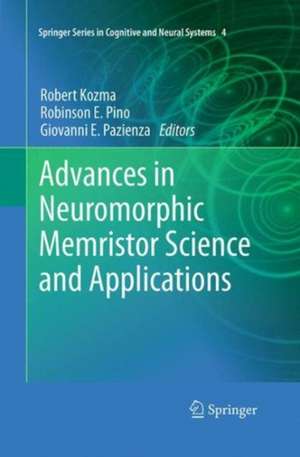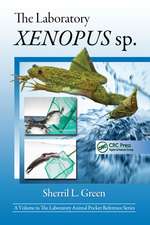Advances in Neuromorphic Memristor Science and Applications: Springer Series in Cognitive and Neural Systems, cartea 4
Editat de Robert Kozma, Robinson E. Pino, Giovanni E. Pazienzaen Limba Engleză Paperback – 23 aug 2016
| Toate formatele și edițiile | Preț | Express |
|---|---|---|
| Paperback (1) | 1298.46 lei 38-44 zile | |
| SPRINGER NETHERLANDS – 23 aug 2016 | 1298.46 lei 38-44 zile | |
| Hardback (1) | 1413.45 lei 6-8 săpt. | |
| SPRINGER NETHERLANDS – 28 iun 2012 | 1413.45 lei 6-8 săpt. |
Preț: 1298.46 lei
Preț vechi: 1366.81 lei
-5% Nou
Puncte Express: 1948
Preț estimativ în valută:
248.61€ • 255.02$ • 209.31£
248.61€ • 255.02$ • 209.31£
Carte tipărită la comandă
Livrare economică 22-28 februarie
Preluare comenzi: 021 569.72.76
Specificații
ISBN-13: 9789402406153
ISBN-10: 9402406158
Pagini: 320
Ilustrații: VIII, 320 p.
Dimensiuni: 155 x 235 mm
Ediția:Softcover reprint of the original 1st ed. 2012
Editura: SPRINGER NETHERLANDS
Colecția Springer
Seria Springer Series in Cognitive and Neural Systems
Locul publicării:Dordrecht, Netherlands
ISBN-10: 9402406158
Pagini: 320
Ilustrații: VIII, 320 p.
Dimensiuni: 155 x 235 mm
Ediția:Softcover reprint of the original 1st ed. 2012
Editura: SPRINGER NETHERLANDS
Colecția Springer
Seria Springer Series in Cognitive and Neural Systems
Locul publicării:Dordrecht, Netherlands
Cuprins
Part I Fundamental Concepts of Memristors and Neuromorphic Systems. - Prolog ? Memristor Minds. - 1. Are Memristors the Future of AI? ? A Review of Recent Progress and Future Perspectives. - 2. Biologically-Inspired Electronics with Memory Circuit Elements. - 3. Persuading Computers to Act More Like Brains. - 4. Memristors for More Than Just Memory: How to Use Learning to Expand Applications. - Part II Computational Models of Memristors. - 5. Computational Intelligence and Neuromorphic Computing Architectures. - 6. Reconfigurable Memristor Fabrics for Heterogeneous Computing. - 7. Statistical Memristor Model and Its Applications in Neuromorphic Computing. - 8. Adaptive Resonance Theory Design in Mixed Memristive-Fuzzy Hardware. - 9. Memristor SPICE Modeling. - Part III. Hardware Embodiments with Memristive Properties and Applications. - 10. Energy-Efficient Memristive Analog and Digital Electronics. - 11. Memristor Models for Pattern Recognition Systems. - 12. Phase Change Memory and Chalcogenide Materials Neuromorphic Applications: Emphasis on Synaptic Plasticity. - 13. A Columnar V1/V2 Visual Cortex Model and Emulation. - 14. Polymer and Nanoparticle-Composite Bistable Devices: Physics of Operation and Initial Applications.
Textul de pe ultima copertă
Posited by Professor Leon Chua at UC Berkeley more than 40 years ago, memristors, a nonlinear element in electrical circuitry, are set to revolutionize computing technology. Finally discovered by scientists at Hewlett-Packard in 2008, memristors generate huge interest because they can facilitate nanoscale, real-time computer learning, as well as due to their potential of serving as instant memories. . This edited volume bottles some of the excitement about memristors, providing a state-of-the-art overview of neuromorphic memristor theory, as well as its technological and practical aspects.
Based on work presented to specialist memristor seminars organized by the editors, the volume takes readers from a general introduction the fundamental concepts involved, to specialized analysis of computational modeling, hardware, and applications. The latter include the ground-breaking potential of memristors in facilitating hybrid wetware-hardware technologies for in-vitro experiments. The book evinces, and devotes space to the discussion of, the socially transformative potential of memristors, which could be as pervasive as was the invention of the silicon chip: machines that learn in the style of brains, are a computational Holy Grail.
With contributions from key players in a fast-moving field, this edited volume is the first to cover memristors in the depth needed to trigger the further advances that surely lie around the corner.
Based on work presented to specialist memristor seminars organized by the editors, the volume takes readers from a general introduction the fundamental concepts involved, to specialized analysis of computational modeling, hardware, and applications. The latter include the ground-breaking potential of memristors in facilitating hybrid wetware-hardware technologies for in-vitro experiments. The book evinces, and devotes space to the discussion of, the socially transformative potential of memristors, which could be as pervasive as was the invention of the silicon chip: machines that learn in the style of brains, are a computational Holy Grail.
With contributions from key players in a fast-moving field, this edited volume is the first to cover memristors in the depth needed to trigger the further advances that surely lie around the corner.
Caracteristici
The first book entirely devoted to memristive devices Comprehensive coverage of memristors from fundamentals to advanced applications Review of present status and future potential of memristors Thorough overview of applications in various disciplines. Includes supplementary material: sn.pub/extras




















